Founder and Artistic Director of Tribe of Fools, Terry Brennan is back on stage this month in the Philadelphia SoLow Fest, with his company’s latest offering School Play. The original one-man show, created in conjunction with Director Jack Tamburri, examines the impact ADHD (attention deficit hyperactivity disorder) had on Brennan’s life as a student, making it difficult for him to sit still in the classroom and to focus on his academic studies.
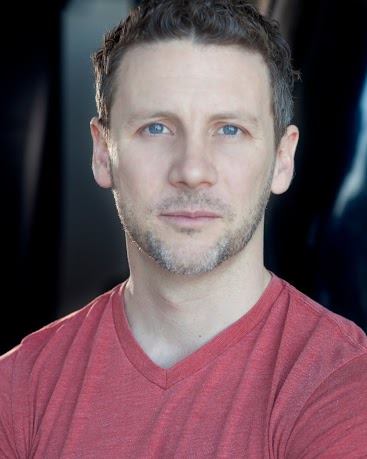
In keeping with Tribe of Fools’ signature style, the new 65-minute narrative work combines comedy and drama with exciting acrobatics, parkour, and other physical skills at which Brennan has become a master. In his critically-acclaimed career as a theater artist, he not only creates, performs, and directs, but is also an accomplished acrobat and parkour athlete, a certified parkour instructor through PPK Academy, and an instructor of children’s circus classes and parkour at the Philadelphia School of Circus Arts. His success in discovering and pursuing what he is good at, despite his trouble with traditional academic disciplines, is a story that is relevant for kids like him, and for their teachers, classmates, and parents.
Prior to the show’s Philadelphia opening on June 9, I had a conversation with Terry about the challenges he faced as a child, teenager, and young adult, how he was able to overcome them, and what he hopes to accomplish with his presentation of School Play.
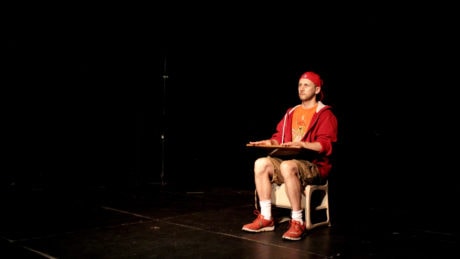
Deb: Is this your first truly autobiographical work?
Terry: Yes, it’s very personal, and it’s scary to do something based on my real experiences! If audiences don’t like it, I don’t know what to say, because it really happened. Luckily it has been well received by everyone so far. I did it in the SoLow Fest last year, and every day, for five performances, educators at each would respond directly, wanting us to bring the show to their schools, to do it for their staff. We did; we’ve tested the material with a South Jersey school district, at the University of Pennsylvania’s School of Education, and in Boston for ninth-graders and school staff. One kid said, “This is a show about me. Thanks.” That meant a lot. It’s 20 minutes longer now, and we don’t want to be overly preachy, but we want to show what it’s like for these kids – kids like me.
I’ve used different experiences and ideas I had growing up in some past pieces, like Heavy Metal Dance Fag, but they were more crafted and invented. There was the smell of autobiography, but I didn’t grow up in South Philly, I didn’t have those exact problems. For School Play, Jack [Tamburri] and I just met for a week and I told him stories, then we figured out how to put it on stage. We made a list, put it in order, and came up with ideas of how to stage it, mostly pulled directly from the things I actually did. In the piece, the kid is in fourth grade and it takes place in a single day. My stories cover about ten years, but it’s still completely believable in terms of what I could have done on one particularly bad day in class.
Why was it so important for you to do a show about your experiences in school?
When I was growing up, and not doing well in school, teachers said to me, “You’re your own guy,” or “You’re creative.” But there are kids out there who are doing their best, who are really trying their hardest, but are not getting it – and they’re often treated like they’re not getting it on purpose. I didn’t know how to vocalize that at the time, to tell everyone that I wasn’t doing it on purpose, that I really was trying. Even kids who don’t have ADHD or autism are sometimes treated like they’re bad, like they’re troublemakers. But they just need space and understanding, not anger or insults. That’s why I think it’s important to present this in an entertaining way, so that people see what it’s like from the kids’ perspective.
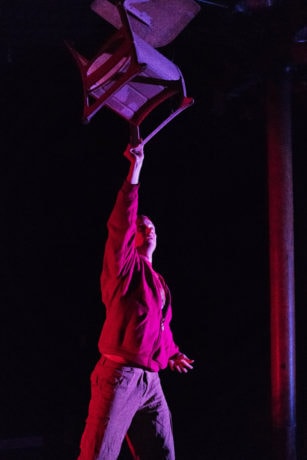
When were you diagnosed with ADHD?
I wasn’t diagnosed till I was 35. I guessed that maybe I had it when I was in college, based on pharmaceutical commercials I saw on TV in the late ‘90s. I told my mother, who tends to minimalize things, and she said, “Don’t worry about it, everybody has something!” Then when I was touring with Enchantment Theatre Company, I loved moving around to different places every day. After the tours finished, living day to day in Philadelphia was a big adjustment. Most people have trouble touring, but for me it was the opposite. I was depressed, so I went to see a doctor, who told me I wasn’t depressed, that it was typical of someone who has ADHD. I was now working counter to the way my brain works, whereas touring worked with my strengths. I was hesitant to go on medication for ADHD because I also have epilepsy – though I haven’t had an episode for many years now – so instead I worked on strategies to be active. I became a work-out junkie, because I was calmer and more focused after working out.
Were you happy as a child during recess and in gym class?
I loved gym, though I was really bad at traditional sports. But because we played dodge ball and other games, rather than regular sports, I could run around and release all of my pent-up energy. Recess gave me room to breathe. When my mother told me we’d get less recess time as we advanced through school, I panicked; I knew I needed that time to be active. I also loved music class, though I’m not a singer.
At what point did you realize you were better at more physical skills than at academics?
I was in college before I figured that out. The only reason I went to college was because I wanted to do theater. My high-school teachers insisted that we all had to go to college, they were constantly pushing that. I didn’t know yet what I wanted, so I was going to take a year off. Why would I want four more years of abuse? But then I had more freedom in college; I could take what I wanted and drop the courses that I didn’t like. That’s where I realized I was better at physical skills – in the theater program. There I discovered that not everyone could do those, the things I’m good at.
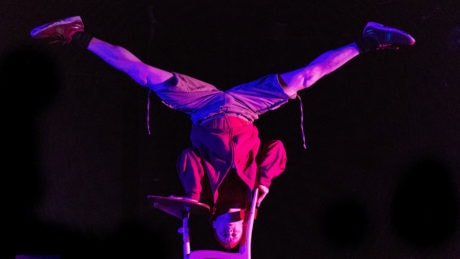
What physical and acrobatic skills have you incorporated into School Play?
A lot! I went to the Dell’Arte School, and this is the closest I’ve done to regular clowning. I rock back in my chair, fall back without killing myself, and I’ve been able to minimize hurting myself – only two or three times (when you fall on your head, it hurts)! I do a tango with my desk, and other manipulations and maneuvers with it. There is a parkour sequence at the lunch table, which is the effect of having eaten too much sugar. In general, there’s a lot of crashing!
What’s your first creative memory?
When I was in fourth grade, I saw a Disney Channel show about Albert Einstein, and I was floored! I didn’t realize at the time how famous he was, and I wanted everyone to know about him, so I wrote a report, unprompted, and took it to my teacher. I got an A; I can’t remember if I got credit for it, but in class she said, “For those of you who are creative like Terry . . .” I didn’t know what she meant by that, so I asked, and she explained that I was inspired and I decided to create something. That was the first time “creative” was used about me.
Also in fourth grade, I was chosen to play Jesus in a school play during Lent, about the Stations of the Cross (I went to Catholic school). The class was told to vote for someone who was interested in religion and who was the most Jesus-like. I asked a lot of questions in church about the sermons, so they picked me. Then I stressed out, because I wanted to get it right! I really thought about it; should I cry, or make noises, during the Passion? I practiced in my room at home, as well as in school. So fourth grade was a big year for my creative self!
What advice would you give teachers and parents on how best to support kids like yourself?
I have a rule when I teach: If kids aren’t being disruptive, let them do what they want. You have to be patient. I sometimes find with teachers that it’s about “respect my authority.” But when I was in school, they didn’t know much about ADHD or autism, and there are neurological disorders that we might not know about yet, so be patient, work with the kids. Tell them what the deadlines and expectations are, but also give them some autonomy to do it the way they need to; meet the kids where they are. If they’re not actively disruptive to the rest of the class, let it go. Don’t use a raised voice as the standard, because then no one will ever respond to anything except a raised voice, and that’s not good for anyone.
What do you hope young audiences will take away from the show?
I did School Play in Boston for 700 ninth graders, because their school recognized that it’s a tough age; they told me, “These guys are a mess.” At the end of the performance, they asked if there’s anything else I’d like to say to the students besides “Don’t be terrible to your teachers”? So I asked how many of them felt they got into trouble a lot or were unfairly treated? Only ten hands went up. I thought there were many others who were afraid to speak out or to put their hands up. So I said, “You are not your grades, or your job, or how much money you make in the future. Make the choices that give you what you want when you are out of here, the ones that feel right for you. But also finish your high-school degree.” I once felt that I was at a social disadvantage as a restaurant worker when I waited on someone I knew from high school, so I didn’t want any of them to feel that way because they didn’t graduate.
What’s up next on your schedule after School Play?
I’m going to Rome a day after School Play closes; a relative won a trip and invited me to go, so I’m very excited about that! Then we do Fishtown this year in the Fringe in September. The cast is already rehearsing, and I’m helping with the writing.
Many thanks, Terry, for sharing your personal story with us. Best wishes for the continued success of School Play, and kudos on finding yourself and on making art that can make a difference!
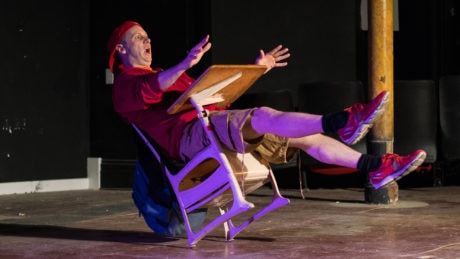
School Play plays Friday, June 9, through Sunday, June 25, 2017, at Tribe of Fools, performing at St. Peter’s School – 319 Lombard Street, Philadelphia, PA. For tickets, call (215) 284-1178, or purchase them online.




